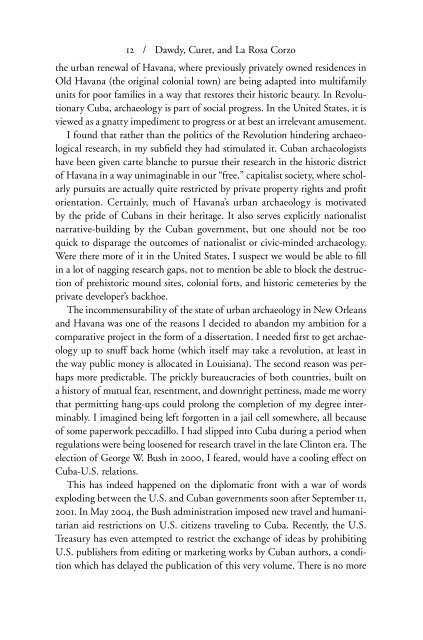Dialogues in Cuban Archaeology
by L. Antonio Curet, Shannon Lee Dawdy, and Gabino La Rosa Corzo
by L. Antonio Curet, Shannon Lee Dawdy, and Gabino La Rosa Corzo
You also want an ePaper? Increase the reach of your titles
YUMPU automatically turns print PDFs into web optimized ePapers that Google loves.
12 / Dawdy, Curet, and La Rosa Corzo<br />
the urban renewal of Havana, where previously privately owned residences <strong>in</strong><br />
Old Havana (the orig<strong>in</strong>al colonial town) are be<strong>in</strong>g adapted <strong>in</strong>to multifamily<br />
units for poor families <strong>in</strong> a way that restores their historic beauty. In Revolutionary<br />
Cuba, archaeology is part of social progress. In the United States, it is<br />
viewed as a gnatty impediment to progress or at best an irrelevant amusement.<br />
I found that rather than the politics of the Revolution h<strong>in</strong>der<strong>in</strong>g archaeological<br />
research, <strong>in</strong> my sub¤eld they had stimulated it. <strong>Cuban</strong> archaeologists<br />
have been given carte blanche to pursue their research <strong>in</strong> the historic district<br />
of Havana <strong>in</strong> a way unimag<strong>in</strong>able <strong>in</strong> our “free,” capitalist society, where scholarly<br />
pursuits are actually quite restricted by private property rights and pro¤t<br />
orientation. Certa<strong>in</strong>ly, much of Havana’s urban archaeology is motivated<br />
by the pride of <strong>Cuban</strong>s <strong>in</strong> their heritage. It also serves explicitly nationalist<br />
narrative-build<strong>in</strong>g by the <strong>Cuban</strong> government, but one should not be too<br />
quick to disparage the outcomes of nationalist or civic-m<strong>in</strong>ded archaeology.<br />
Were there more of it <strong>in</strong> the United States, I suspect we would be able to ¤ll<br />
<strong>in</strong> a lot of nagg<strong>in</strong>g research gaps, not to mention be able to block the destruction<br />
of prehistoric mound sites, colonial forts, and historic cemeteries by the<br />
private developer’s backhoe.<br />
The <strong>in</strong>commensurability of the state of urban archaeology <strong>in</strong> New Orleans<br />
and Havana was one of the reasons I decided to abandon my ambition for a<br />
comparative project <strong>in</strong> the form of a dissertation. I needed ¤rst to get archaeology<br />
up to snuff back home (which itself may take a revolution, at least <strong>in</strong><br />
the way public money is allocated <strong>in</strong> Louisiana). The second reason was perhaps<br />
more predictable. The prickly bureaucracies of both countries, built on<br />
a history of mutual fear, resentment, and downright pett<strong>in</strong>ess, made me worry<br />
that permitt<strong>in</strong>g hang-ups could prolong the completion of my degree <strong>in</strong>term<strong>in</strong>ably.<br />
I imag<strong>in</strong>ed be<strong>in</strong>g left forgotten <strong>in</strong> a jail cell somewhere, all because<br />
of some paperwork peccadillo. I had slipped <strong>in</strong>to Cuba dur<strong>in</strong>g a period when<br />
regulations were be<strong>in</strong>g loosened for research travel <strong>in</strong> the late Cl<strong>in</strong>ton era. The<br />
election of George W. Bush <strong>in</strong> 2000, I feared, would have a cool<strong>in</strong>g effect on<br />
Cuba-U.S. relations.<br />
This has <strong>in</strong>deed happened on the diplomatic front with a war of words<br />
explod<strong>in</strong>g between the U.S. and <strong>Cuban</strong> governments soon after September 11,<br />
2001. In May 2004, the Bush adm<strong>in</strong>istration imposed new travel and humanitarian<br />
aid restrictions on U.S. citizens travel<strong>in</strong>g to Cuba. Recently, the U.S.<br />
Treasury has even attempted to restrict the exchange of ideas by prohibit<strong>in</strong>g<br />
U.S. publishers from edit<strong>in</strong>g or market<strong>in</strong>g works by <strong>Cuban</strong> authors, a condition<br />
which has delayed the publication of this very volume. There is no more


















